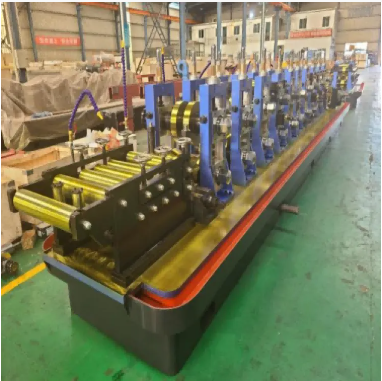Comprehensio Necessitatum Productionis Tuae
Aestimatio Requisitionum Capacitatis Exitus
Claram imaginem capere quae machinae tuborum ferrei efficiendi opus habeant est necessarium, si fabricatores cum petitionibus mercati sine inpendio rerum superfluorum contendere velint. Initium est in visum productionis volumina proiecta, ut idoneam magnitudinem machinae ad opus invenias. Machinae quae operis oneri respondent qualitatem et celeritatem tuerentur, nec opus ullam vim superfluum sentit. Etiam futura providere interest. Multi cives vetustis machinis ineptis utuntur, quia pro incremento futuro non consulerunt, cum primum in machinas conlocare vellent. Sapientes cives machinas emunt quae nunc bene operantur, sed etiam spatium relinquant, ut cum petitione aucta crescant. Alium autem gradum necessarium est in locis quaerere, ubi nunc operationes impediuntur. Frequenter in stationibus soudandis aut in partibus secandis difficultates oriuntur, cum maxima productio sit. Machinis emendatis in his locis collocatis celeritas totius processus saepe augebitur et intermissiones minuentur.
Definire Specifiche delle Tube (Diametro, Spessore)
Lucidus esse de eo, quid tibi opus sit tubis antequam machinas eligas, omnem differentiam facit ad producendum quod proponitur. Primum considera, quae sunt diametrae et crassitudinis parietis necessitudines, quia diversae artes omnino alias dimensiones postulant. Aliis rebus opus est tubis crassorum parietum, aliis tenuiorum satis est, itaque hoc scire antea praecavet difficultates futuras, cum tubi non ita se gesserint, ut sperabatur. Etiam normae artificum momenti sunt, quod minimas tutitudinis necessitudines in variis campis, a ductibus olei ad distributionem aquae, statuunt. Cura, ut quaecumque machina eligatur, bene conveniat cum iuncturis iam in loco in aedificio. Aliter, postea fortasse problemata erunt coniungendi novas tubos cum vetere structura. Tempus sumere ad haec omnia intellegenda meliores electiones machinarum efficit, quae re vera aptae sunt ad loci necessitudines, non ad generalia remedia, quae in operatione deficiunt.
Compatibilità dei Materiali e Applicazione
Genera Ferri Supportata ab Machina
Sciendum est, quanti generis ferrum unaquaeque machina tractet, si velis ex productionibus utilitatem capere. Plurimi operarii cotidie cum ferro carbonaceo et ferro inoxidiabili vulgari negotiantur. Hi diversi materiales propriam quandam naturam et proprietates habent, igitur considerare, num machina has differentias sustinere possit, magni momenti est. Etenim, quod ad ferrum ductorum attinet, ex eo pendet, quam validi sint et quam bene contra corrosionem anni temporis resistere queant. Etiam cum factoribus machinorum colloqui proficit, quoniam forsitan ferrorum varietates praecipuas suggerere possunt, quae in certis conditionibus melius performant. Si hoc recte fiet, machinae satis flexibilis manebunt ad omnes necessitates productionis, quae mense vel trimestri sequente oriantur, obviandum.
Requisita Tegumenti et Tractatus Superficialis
Praetensiones et tecturae superficiei magnam partem agunt in aetate et meliore functione tuborum e ferro in variis conditionibus. Exempli gratia, in locis ubi multa est humiditas, saepe opus est tecturis specialibus quae ferrugini resistant, ut tubi non deteriorentur tempore. Perspicuum esse debet quaenam praetensio superficiei optime valeat, quod pendet e loco ubi tubi usum iri. Aspectus superficiei etiam valet, non solum propter functionem. Finis politus praecipue refert propter speciem et diuturnitatem. Quaerendo de machinis, necesse est considerare num machinae varia tecturae genera, ut zincorum vel pulverulentarum, sustinere possint. Machinae quae plures tecturas tractare possunt et tamen producta bona qualitate efficiunt, saepe sunt quae prospere an non processus productionis expleatur determinent.
Elementa Principalia Machinae Ad Prioritatem
Nivel Automatisatonis et Systemata Controlis
Machinae ad fabricandam tubulorum ferrearum automatio multum refert cum de emptione decernitur. Machinae automatizatae laborem minuunt dum celeritatem in processu productionis augent. Minus opere manu facto a operariorum parte indigent et celerius fungebantur quam machinae manuales. Systemata automata summa perfectione etiam pro constantia processuum mirabiliter valent. Audentiam operariorum minuunt et denique pecuniam conservant. Tabularia tamen aequaliter momenti sunt. Operariorum res debet esse quae absque difficultate programmare possunt. Optima machinae cum tabulis instructae sunt quae parametrorum constitutionem etiam ad novos facilem reddunt. Ne obliviscaris quidem de idoneitate ad integrandam machinam in ordinatione fabricae iam existente. Machinae quae in currentes operationes sine difficultate inseruntur in negotiis quotidiano maxime iuvant.
Precision Engineering for Congruentes Quality
Praecisam rationem bene constituere omnem differt fabrifaciendo tubos ex solido ferro saepe atque saepe. Omnis inspiciens in instrumentis tuborum conficiendorum debet attendere ad genera quae praecisam rationem utuntur. Accipe exemplum CNC technologiae, ut systemata Numericae Dominationis Computeratae quae constantiam augent quia omnes partes processus manufacturae regunt usque ad minutissima, qua de causa vitia minuuntur. Etiam videre debes quantas tolerationis machina quaedam sustinere potest. Machinae quae strictiores tolerationis capaces sunt saepe meliores tubos efficiunt qui in conditionibus realibus melius funguntur. Praeter solam custodiam qualitatis, opus praecisum adiuvat manufactores ad implenda iura severa industriae quae nunc omnes loquuntur. Haec tandem tollit procul dubio qualitatem productionis penitus.
Durabilitas Rotarum et Componentium Formandi
Duratio valvarum et partium formandarum magni momenti est cum machinis tuborum ferrearum eliguntur. Haec instrumenta multis in rotationibus productivis defatigantur necesse estque functionem diuturnam conservare. Qualitas materiae praecipue refert - ferro fuso contra ferrum induratum plane alia aetate utens sub conditionibus industrialibus. Fabricatores regulas de conservatione huiusmodi partium solent edere, igitur operarii ea diligentissime custodire debent, ne casus fortuitus intercessio fiat. Praeterea, praesidium solum de vetustate partium comparandum est, quod complures societates protectionis formulas pro hoc ipso negotio proferunt. Machinae, quae ex partibus diuturnis confectae sunt, inter intermissiones longius producunt, quod in minorem numerum interruptionum et in minores sumptus totius vitae operativae convertitur.
Iudicium Fabricatoris Evaluandum
Experientia Industriae et Scientia Technica
Quaerere de manufactoribus tuborum ex ferro spectat primum ad tempus quod iam operantur et ad peritiam technicam quam habent. Illi qui diu manent saepe fida opera producunt quia norunt quid in praxi valet. Fama quidem refert, sed etiam utrum novas technologias sequantur an vetera methodos tantum teneant. Cura etiam inspicere titulos in curriculis eorum. Certificata hic magni momenti sunt quia doctrinam veram post iactantias de peritia ostendunt. Testimonia clientium sunt pretii aurei. Narrationes verae eorum qui machinas anno ante emerunt multa de usu cotidiano et problematibus nemo in catalogis mentio facit. Studia casuum adiuvant vitare difficultates antequam eveniant, quare emptores serii semper ea postulant primo loco.
Post-Venditionem Supportio et Servitia Maintenance
Post-venditio subsidium vere refert ad negotia in nova instrumenta investientia. Cum societates bonam doctrinam suis operariis de machinarum operatione et cura regulari praebent, omnem differentiam facit ut cuncta rite et expeditissime cum currentibus operationibus incipiantur. Etiam partes deputatae hic magnam partem agunt. Sine facile accessu ad componentes substitutionis, etiam parvae difficultates in maiores problemata verti possunt, dum machinae propter dies vel hebdomades vacuae manent. Antequam emptionem peragant, sapientes administratores semper considerant quam generis auxilium clientium adepturi sint. Celeris responsionis tempus et fida auxilia technica significat celeriter difficultates corrigi, non autem producendi moras protrahere. Bona autem servitia conservationis non solum optanda sunt, sed vere necessaria ad productionem robuste peragendam et minuendos sumptus in caris reficiendis rationibus temporis.
Capacitates Customizationis pro Necessitatibus Unicis
Cum solutionibus manufacturatis spectantur, magna refert quantae personalizationi locus sit praebendus ab industriae necessitatibus speciales. Machinas ad mensuram accommodare saepe ducit ad meliorem efficaciam et maiorem flexibilitatem in universo. Antequam quicquam decernatur, utile est cum manufacturis de mutationibus quas implementare possunt colloqui. Nonnulli tantum leves varietates offerunt dum alii programmatum modificationum ampla habent. Exempla praeclara ex usu sunt, cum videtur apud quos iam eae machinae ad mensuram factae sint. Exempla e veris rebus sumpta demonstrant, num tales mutationes reapse in machinas convertantur, quae ad productionis metas perveniant. Illae societates manufacturas inveniunt, quae operam suam circum specificas illarum difficultates adaptare velint, saepe praestant et praeventiores sunt ad versari in mutationibus mercati, quod operationes eorum non in solutionibus omnibus aptis fixae sunt.
Analyse Cost-Efficientiae
Investigatio Initia vs. Costus Operationales Longi-Term
Cum de pecuniae ratione spectatur ad comparandum tuborum ferro congerendorum machinam ad negotia administranda, sunt complura quae consideranda sunt. Optima ratio commodorum et onerum comparat quae ad incipiendum opus est cum perpetuis impensis, ut in usu tenui et repertis partibus versus iterum. Haec ratio plerumque inspicit res ut operariorum necessitates et quomodo aliae in eodem genere negotiorum impensas habeant. Negotia numquam praetermittunt primarias expensas cum iis quae in tenuendo machina per tempus expenduntur aequare, quod directe afficit utrum emtio ratione pecuniariae sana sit. Diversas in foro machinas inspicando easque notando quae minus saepe frangantur aut minus saepe curandae sint, melius indicium datur quanta pecunia pro operando probe in subsequentibus annis separanda sit.
Consumptio Energiae et Reductionis Litterarum Facultates
Cum in fabricandis tubis ex ferro quaerimus, energiae efficientia et facultates reductionis inutilis multum momenti habent ad minuendos expensas gestione et ad adiuvandos metas virides consequi. Partes inspecta sunt quae in his machinis re vera vim servent - hoc autem in longo tempore expensas electricitatis minuere potest et adiuvare fabricas ut in via mansurae sint cum pollicitationibus suis de sustentatione. Systemata inutilis gestionis durante productione sunt alterum magnum particulam dignam inspiciendi. Quidam fabricatores optimas habent dispositiones quae ad minimum reducunt fragmenta et materia inutilia. Pro societatibus quae conantur activitatem officinae cum latioribus politiis environmentalibus societatis congruere, cognoscere quantum inutilis a machina quodam generatur omnem differentiam facit. Machinae hisce generis cum talibus praeditae non solum melius fungebuntur sed etiam sustinebunt initia viridia per diversos sectores.
FAQ
Quid est importancia aestimandi requisita capacitatis output?
Aestimatio requirmentorum capacitatis output iuvat ad certificandum quod machinae fabricantes tubos ferreos possint efficienter satisfacere demandis productionis praesentibus et adaptari ad crescendum in futuro.
Cur specificae specificationes tubi sunt cruciales?
Specificationes speciales tubi, sicut diameter et crassitudo, sunt vitales pro selectione machinarum quae producunt tubos convenientes necessitatibus applicationis et compliance industriae.
Quomodo automation influat productionem tuborum ferreorum?
Automation diminuit onera laboris, auget efficientiam productionis, et meliorat velocitatem operationis per minuendum interventionem manualem.
Quid in ingenio praecisionis considerandum est?
Ingenium praecisionis certificatur constantem productionem tuborum altioris qualitatis per technologias utentes CNC pro processibus manufacturis accuratis.
Cur est post-venditionem support importantia?
Robustum post-venditionem support, includente formationem et disponibilitatem partium reservatarum, certificat integrationem machinarum sine intermissione et conservationem.

